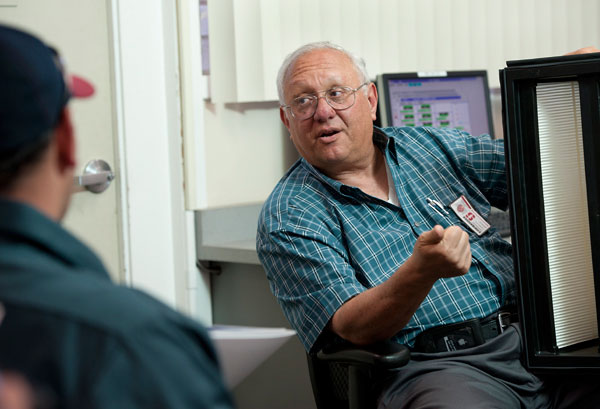Amy J. Blue Award winner Steve Papier credits Blue herself for his leadership style
Steve Papier, one of this year's Amy J. Blue Award winners, has maintained support systems for campus buildings for 44 years. Now the supervisor of engineering trades on campus, Papier draws his leadership style from his experiences with Blue herself.
Steve Papier, a supervisor of engineering trades on campus, has been awarded one of three 2012 Amy J. Blue Awards. Papier started working in the heating, ventilation and air conditioning (HVAC) department as a technician in 1968, when he was 23. After 44 years of work maintaining the buildings on campus, he now supervises the 70 workers who control campus plumbing, electrical and HVAC systems.
Throughout his career he has worked in almost every job he now oversees. "The value of coming up through the ranks is that you remember what it was like to be in that position," said the jovial Papier.
"You learn all sorts of ways not to do things," he joked.
Receiving the Amy J. Blue Award is special for Papier because of the personal inspiration that he drew from his relationship with Amy Blue herself.
His brush with Blue
His first encounter with Blue's innovative leadership style was during his role as a union steward in the 1980s. Papier had the role of airing grievances on behalf of the workers' union. At the time, Blue was the facilities director for the university. "I was prepared to do battle because there were jobs on the line," said Papier, "but the first thing she said to me was, 'You know Steve, you're right.' So, instead of a battle, we had a conversation and at the end she hugged me. ... It was pretty bizarre for those times."
Papier said he believes that Blue's leadership style created a culture shift on campus that laid the groundwork for how he now interacts with those he supervises.
"A supervisor used to police," said Papier, "but now they mentor, teach, help people grow and make them feel good about the importance of the system that they support.
"She empowered everyone and made everyone excited about coming to work at Stanford," he said. "Work wasn't just a place you came to pick up your paycheck anymore."
Papier's style reflects Blue's leadership ideals. His dedication to creating a positive work environment is steadfast. He received several letters of nomination for his award from colleagues and coworkers who wrote in glowing terms about his humble leadership, dedication to creating a more compassionate workplace and consistently positive attitude.
He is admired by those whom he works with and particularly the team that he leads. Coworker Jocelyn Steffen wrote, "I have worked in most of the shops in Facilities and I have never before worked in a shop where everyone in it will, almost literally, walk over hot coals for the supervisor."
Papier believes that treating people with dignity is fundamental to cultivating a functional workplace. "Steve feels very strongly that people perform better when they are respected and empowered," wrote Steffen.
The respect is mutual and his team enthusiastically follows his guidance. For example, one colleague wrote:
"During the winter, usually once or twice, the temperatures will drop to a level that requires our technicians to work through the night, sometimes for days in a row, to ensure that the systems on campus continue to function properly and are not damaged by freezing water. Not once has Steve had to require a technician to come in against his will. There are always more volunteers than there is work to do. And this is miserable work, let me tell you. But they do it. And they do it willingly, because he asked them to."
Working as caretakers of a legacy
"Caretakers of a Legacy" is labeled on the tailgate of maintenance trucks on campus; Papier brings that role to life. Dedication to Stanford's mission is central to his leadership.
"We are preventive, predictive and proactive," said Papier. "We take care of the systems in the bowels of buildings without people ever noticing and we make sure that the lights don't go out during important research. We are here to support teaching and research."
He takes great pride in bestowing that vision to everyone on his team – seeing importance in being a part of something bigger. "There is continuity in the vision, from management right down to the guy fixing the toilet. We are caretakers of a legacy," said Papier.
"Steve is committed to his people and he is dedicated to an important accomplishment, having research run without any surprises, and for students, staff and faculty to go into buildings and not think about their maintenance," wrote a coworker, Scott Hofflander.
The other two winners of this year's award are Denni Dianne Woodward, associate director of the Native American Cultural Center, and Donnovan Yisrael, a student affairs officer in the Vaden Health Center.
The three will be honored on Wednesday, May 16, in a ceremony that will take place from 3:30 to 5 p.m. in the central courtyard of Lagunita Court (on Santa Teresa Street, across from Roble Field). The award comes with a $3,000 prize and an "A" parking permit for the 2012-13 academic year.
What is Papier planning to do now that he has won the Amy J. Blue Award?
"This isn't about some old guy getting a plaque," said Papier. "I am probably going to park in the same place and walk for the exercise. This is really to remind us that she is the one that made this change at Stanford and brought us to where we are today. ... It says your life really matters.
"Amy Blue planted seeds here and some of them stuck," said Papier.
Kate Ashe is an intern at the Stanford News Service.


Share This Story